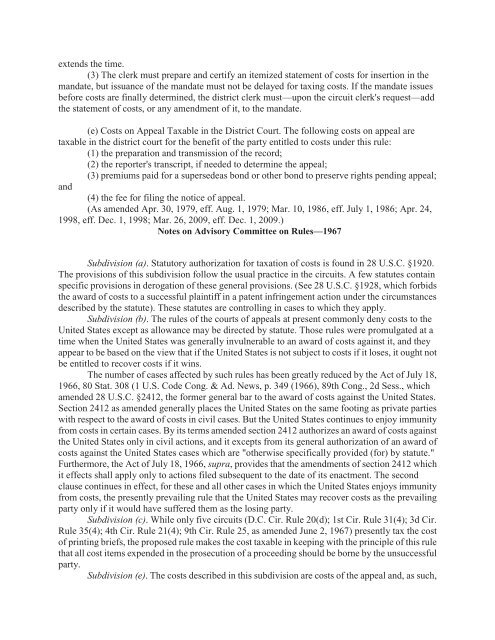Federal Rules of Appellate Procedure 2014-2015, 2014a
Federal Rules of Appellate Procedure 2014-2015, 2014a
Federal Rules of Appellate Procedure 2014-2015, 2014a
You also want an ePaper? Increase the reach of your titles
YUMPU automatically turns print PDFs into web optimized ePapers that Google loves.
extends the time.<br />
(3) The clerk must prepare and certify an itemized statement <strong>of</strong> costs for insertion in the<br />
mandate, but issuance <strong>of</strong> the mandate must not be delayed for taxing costs. If the mandate issues<br />
before costs are finally determined, the district clerk must—upon the circuit clerk's request—add<br />
the statement <strong>of</strong> costs, or any amendment <strong>of</strong> it, to the mandate.<br />
(e) Costs on Appeal Taxable in the District Court. The following costs on appeal are<br />
taxable in the district court for the benefit <strong>of</strong> the party entitled to costs under this rule:<br />
(1) the preparation and transmission <strong>of</strong> the record;<br />
(2) the reporter's transcript, if needed to determine the appeal;<br />
(3) premiums paid for a supersedeas bond or other bond to preserve rights pending appeal;<br />
and<br />
(4) the fee for filing the notice <strong>of</strong> appeal.<br />
(As amended Apr. 30, 1979, eff. Aug. 1, 1979; Mar. 10, 1986, eff. July 1, 1986; Apr. 24,<br />
1998, eff. Dec. 1, 1998; Mar. 26, 2009, eff. Dec. 1, 2009.)<br />
Notes on Advisory Committee on <strong>Rules</strong>—1967<br />
Subdivision (a). Statutory authorization for taxation <strong>of</strong> costs is found in 28 U.S.C. §1920.<br />
The provisions <strong>of</strong> this subdivision follow the usual practice in the circuits. A few statutes contain<br />
specific provisions in derogation <strong>of</strong> these general provisions. (See 28 U.S.C. §1928, which forbids<br />
the award <strong>of</strong> costs to a successful plaintiff in a patent infringement action under the circumstances<br />
described by the statute). These statutes are controlling in cases to which they apply.<br />
Subdivision (b). The rules <strong>of</strong> the courts <strong>of</strong> appeals at present commonly deny costs to the<br />
United States except as allowance may be directed by statute. Those rules were promulgated at a<br />
time when the United States was generally invulnerable to an award <strong>of</strong> costs against it, and they<br />
appear to be based on the view that if the United States is not subject to costs if it loses, it ought not<br />
be entitled to recover costs if it wins.<br />
The number <strong>of</strong> cases affected by such rules has been greatly reduced by the Act <strong>of</strong> July 18,<br />
1966, 80 Stat. 308 (1 U.S. Code Cong. & Ad. News, p. 349 (1966), 89th Cong., 2d Sess., which<br />
amended 28 U.S.C. §2412, the former general bar to the award <strong>of</strong> costs against the United States.<br />
Section 2412 as amended generally places the United States on the same footing as private parties<br />
with respect to the award <strong>of</strong> costs in civil cases. But the United States continues to enjoy immunity<br />
from costs in certain cases. By its terms amended section 2412 authorizes an award <strong>of</strong> costs against<br />
the United States only in civil actions, and it excepts from its general authorization <strong>of</strong> an award <strong>of</strong><br />
costs against the United States cases which are "otherwise specifically provided (for) by statute."<br />
Furthermore, the Act <strong>of</strong> July 18, 1966, supra, provides that the amendments <strong>of</strong> section 2412 which<br />
it effects shall apply only to actions filed subsequent to the date <strong>of</strong> its enactment. The second<br />
clause continues in effect, for these and all other cases in which the United States enjoys immunity<br />
from costs, the presently prevailing rule that the United States may recover costs as the prevailing<br />
party only if it would have suffered them as the losing party.<br />
Subdivision (c). While only five circuits (D.C. Cir. Rule 20(d); 1st Cir. Rule 31(4); 3d Cir.<br />
Rule 35(4); 4th Cir. Rule 21(4); 9th Cir. Rule 25, as amended June 2, 1967) presently tax the cost<br />
<strong>of</strong> printing briefs, the proposed rule makes the cost taxable in keeping with the principle <strong>of</strong> this rule<br />
that all cost items expended in the prosecution <strong>of</strong> a proceeding should be borne by the unsuccessful<br />
party.<br />
Subdivision (e). The costs described in this subdivision are costs <strong>of</strong> the appeal and, as such,


















